FROM THE PSWA PRESIDENT

Greetings.
I hope this newsletter finds you all in good health and spirits, and I hope you all had the best holiday season, given the circumstances.
2020 is behind us, and 2021 has just begun. I’m sure we all hope it will be a better year than the previous one. Is there light at the end of the tunnel? I am confident there is, with the Covid vaccines now being administered. Time will tell.
So, what will that mean as far as our conference is concerned? At this point, it is anyone’s guess. I am hopeful, and somewhat confident, we will be able have the conference in July, without too many restrictions. My main concern is the safety of our members, and that will be the deciding factor. If things do improve, but not enough to safely have the conference in July, we can discuss moving the date to later in the year.
The Board’s annual meeting, usually set for February in Las Vegas, is not likely to happen. If the Orleans isn’t open, and it isn’t safe to travel or attend, we will not be having an in-person meeting. There are things that need to be discussed and decided, and we may fall back on Zoom meetings, or move the board meeting date to a later time.
We have had two Zoom presentations that went off very well. Good topics, and well presented by Marcia Rosen and Dave Knop—thanks to both of you. The plan is to continue offering monthly events, presented by our members, so this is a good opportunity for you to be in the spotlight. If you would like to be a Zoom presenter, please let RJ Beam, our tech guru, know (rj@rescuehumor.com). If you have a PowerPoint presentation, it can be included. Please bear in mind the presentation is limited to 1 hour, including questions. If you are unfamiliar with Zoom, never fear. It is a simple and easy process to join and view. Just ask RJ, or me, how to do it. Look—if I can get my wife to successfully join a Zoom event, then anyone can learn how to join. Talk about technologically challenged!
On a personal note, one good thing that has come out of the shelter-in-place order is that I have been able to do a LOT of writing. I have written a couple of short stories, completed book #7, entitled The List, and am 20,000 words into my 8th novel, as yet untitled. Both books are SFPD homicide Inspector Vince Torelli thrillers.
Two books are currently at the publisher being edited and getting cover art-The List, and An Echo of Lies. The latter is a supernatural thriller with a law enforcement theme, and was awarded third place in the non-published category in the PSWA 2020 writing competition. I hope to have both released sometime in 2021.
Remember, the PSWA writing competition is open for submissions as of January 1, 2021. More information is from the Competition Coordinator, Barbara Hodges, is in this newsletter.
Lastly, I wish you all good health and happiness. Keep writing, and hope to see you all at our next Zoom event, and at the conference.
—John Schembra
President, PSWA
FROM THE VICE-PRESIDENT
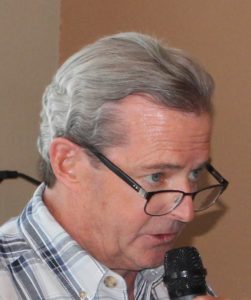
WORDS
Introduction
As I continue to write and refine my style, I find my mind visualizing the words as I form a sentence. I struggle not to use the same word twice on a page, to stay in the active voice, alter sentence length and so on. My goal is that writing becomes second nature. It takes work.
I am also finding that I visualize spoken words and unconsciously critique the speaker’s use of words and phrases. My mind sees the spoken words on a page. I find myself cringing at certain phrases used in abundance and not always in the correct form. I evaluate discussions and media commentary for what would be suitable or unsuitable in written narrative. Overuse and misuse of the King’s English has become my unintended pet peeve.
I’m not alone. At beginning of the year, two young TV announcers/anchors presented their list of overused and abused words. They put “literally” at the top of their list. Unfortunately, many celebrities, including Hollywood A-listers and popular talk show hosts did not see the broadcast, or pay attention if they did. At the top of my list for this Holiday season is, “moving forward.” It’s everywhere—sports, politics and the nightly news. Some examples:
Commentator during the fourth game of the 2020 Stanley Cup Finals – “We will continue to monitor COVID test positive results moving forward.” Redundant?
Tom Bevan, opening of the 9/29/2020 Presidential Debate – “Forward-looking vision for the future.” What?
A prolific and widely-read romance author recently penned advice for fellow writers:
“I think the biggest mistake an author makes when writing a rough draft is stopping and rereading/editing their work. The key is to keep moving forward and get the whole story out.” Could forward be left out without losing the meaning? I vote yes.
Second on my list is, “transparency” and its negative, “lack of transparency.” When did this one replace the more articulate, “lying by omission,” “not being truthful,” “hiding the facts, “without explanation?” Candidate Joe Biden used “transparency” more than once during the 9/2020 Presidential Debate. Even my personal hero, Chris Wray, Director of the FBI, uses “transparency” in his public addresses.
Landing at third on my overuse list are adverbs—those ending in “-ly.” Usually (oops) they waste oxygen. What morning talk show doesn’t broadcast “literally” during every airing?
New Words and Terms
And there is the use of new words, when the tried and true won’t do. For 2020 we have “impactful.” And “content” to describe information. “Break it down” for explaining things. “Deeper look” has replaced closer look and scrutiny. During a Las Vegas Springs Preserve TV ad this past summer, the narrator said, “during a rain event” to describe when it rains; and repeated it three times in one minute! And there is “price point” to describe price; “skill set” to mean skills. Is there no end?
Summing Up
Writing benefits from brevity; using less words to say more. More often than not, it lends itself to a faster paced narrative. As writers, we must embrace the use of a wide and varied vocabulary. Word’s thesaurus feature is a good start. I find reading the work of prominent authors especially useful, such as that of John McPhee. As I took breaks in my book writing to read his tome, Coming into the Country (FSG, 1991), I kept a list of words he used that were unfamiliar to me. The list grew to more than one hundred by the time I finished the book. I kept a dictionary close at hand.
— R. Scott Decker, PSWA Vice President and author of Recounting the Anthrax Attacks.
FROM THE SECRETARY, MORE WRITING ADVICE
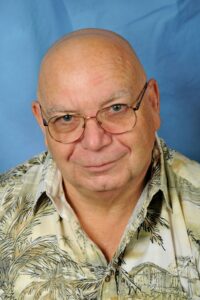 How has the pandemic affected your writing? Has it diminished your creativity? Has it stomped out your ideas for storylines? Has your writers’ group or critique group shut down?
How has the pandemic affected your writing? Has it diminished your creativity? Has it stomped out your ideas for storylines? Has your writers’ group or critique group shut down?
I have to be honest with you my writing has fallen by the wayside. I just can’t get motivated. About two years ago, I was able to write and enter nine short stories/articles/poems in PSWA contests. As of now, I only have one short story written and ready to enter in the upcoming competition. I can’t think of anything else I want to write about.
What I should be doing is looking at the pandemic as a resource for writing. There are so many nonfiction stories about heroism and caring. There’s the opportunity to take this pandemic and turn it into stories about heroes battling the forces of this evil virus. There are novels as well waiting to be written.
We have some great technical writers in the PSWA. For them there are technical articles only a keystroke away. Some technical articles I can think of right now is what is the proper protective equipment to wear when dealing with a COVID-19 victim? How about an article on how to decontaminate rescue vehicles and equipment? One could write human-interest articles about volunteer first responders who had to make choices whether to continue responding or withdrawing in order to safeguard their families. I was surprised to find out 74% of the firefighters in this country are volunteers?
Branch out your writing abilities. Expand your writing horizons. You don’t have to only write about public safety. I recently sold an article to Angels On Earth, a magazine from Guidepost publications. I submitted the story as a lark and was surprised by their prompt interest and a contract for the sale of the article. I was also surprised by how well Guideposts pays their contributors.
An online publication, Grief Digest, has published six of my articles on the topic of grief. Janet, the editor does beautiful art work to accompany your article, and gives you a glowing biography which other editors read.
There are stories begging to be written. All you have to do is look around and find a story that interests you.
Do yourself and your readers a favor. Drag yourself off the couch. Turn the television off. Take your head out of the refrigerator, start doing some research and find something interesting to write about. Now get to work writing and I promise I will try to do the same.
—Keith Bettinger
Secretary
WRITING COMPETITION CHAIR
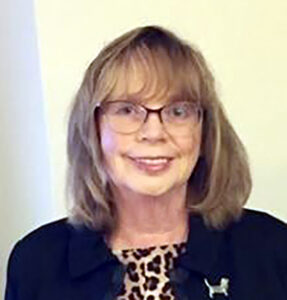 Happy New Year!
Happy New Year!
What a crazy year 2020 has been. Just think we are living right now in what will surely be history in the years to come. I did learn something about myself living with this pandemic. I always lamented I’d produce more writing if I had time. Well, I had the time, plenty of it, but I sure did not produce more writing. In fact, I produced less. I missed my local writing groups. I missed my writing conferences. For me, writing is not a solitary happening. Without my social network of fellow authors, my writing suffered. I will be so happy when my weekly in-person meeting starts again. I am so looking forward to July and the PSWA conference.
As you read this, it’s time to get your entries in for the 2021 PSWA Writing Competition. The information and form is on our website.
A couple of changes this year I’m excited about.
Number 1 is all the entries, except for published books, will be blind-judged. All entries should not have your name on them. Only the entry form will have your name. If you send something that has already been published, make sure your name is not on it…whiteout works if nothing else. When I receive your entry, it will be assigned a number before it goes out to the judge. The judge will not know who you are, and you will not know who the judge is.
The second change is our published fiction books will be judged by 4 judges this year. Each judge will read your book and send me their scores. The winner will be chosen from there.
I love our writing competition. PSWA members are talented writers. When you win or place in the writing competition you have been truly honored. So, get your entry to me. You have until April 15th, 2021. All the categories are listed on the writing competition page on the website.
Last year’s Zoom presentation of the winners was fun, but I look forward to giving you your award in person this year.
Stay safe and I’ll see you in July.
—Barbara M. Hodges
PSWA Writing Competition Chairperson
MY SIXTH GRADE EDUCATION

A lot of people ask me how I became a writer and my answer is always the same. It had a lot to do with my sixth grade education in creative writing. Way back in the day, when I was in grammar school, I was infused with those creative juices. I longed to write something exciting and entertaining, instead of the boring subjects like what I wanted to be when I grew up or what I’d done on my summer vacation. So I kept badgering the teacher, Miss Rehack, to let me write a short story. Now considering that the entire class was terrified of her—she towered over us all wearing black framed glasses with incredibly thick lenses and had a thick mass of hair that was blue in several places. But nonetheless, I kept up my badgering. (Well, perhaps whimpering would be the more appropriate verbiage in this case.)
“Please, Miss Rehack, could I maybe write a story sometime?”
Finally, one Friday afternoon, while we were busily engaged in our workbooks during our work-and-study time, Miss Rehack summoned me to her desk. The desk was a big, wooden monstrosity and I often wondered about the rumor of her stashing the bodies of recalcitrant students in one of the drawers. Trying to swallow the lump in my throat, I approached, wondering if I had done some transgression for which I was going to have to do the dreaded “stay after school and clean erasers” or some other penal task. Had I misbehaved in the lunchroom, or something?
“Yes, ma’am,” I said as I got to the desk.
Her lesson plan book was spread out on the top and I tried to steal a glance to see if any of my papers had angered her. She’d once ripped up one of my papers in front of the class because it was not only late, but “messy.” I’d be lying if I told you my knees weren’t shaking a bit.
“Michael,” she said. “I’m going to let you write your short story. Have it ready to read before the class on Monday.”
I was too stunned to speak.
She stared down at me, her obsidian eyes looking small and deadly through the thickness of the lenses.
As she told me to go back to my desk I felt the ecstasy of relief and anticipation. I was finally going to be able to write that story I’d always wanted to do.
I shared this good news with my best friend, Andy, as we walked home from school about an hour later.
“A story?” he said. “What you gonna write about?”
My mouth suddenly felt dry as it hung open. What was I going to write about?
The delight of getting the assignment suddenly evaporated as the reality of the situation hit me like a sucker punch. I had to come up with a story and have it finished by Monday to read in front of the class … Or else.
Visions of the ripped up paper flashed in my mind.
Oh, Lord, I thought. What have I gotten myself into?
Thoughts of going out to play on Friday afternoon after school were quickly dismissed as I grabbed my notebook and pen and sat at the kitchen table trying to come up with something to write about. I stared at the empty page until supper time with no ideas coming to me. Saturday was even bleaker. Where was that story that I’d been dying to write?
Finally, with desperation cackling over my shoulder, I came up with an idea on Sunday and frantically started writing. It was a mystery story. The hero was a tough private eye named Mike. (There were a lot of private eye shows on in those days.) The villain, I knew, had to be a sinister one, so I latched onto a crooked cop (Lt. Johnson) who had masterminded the crime. I remember little else except that the hero dispatched the bad guy at the end by shooting him with a SCUBA diving spear-gun. (James Bond would use one of those years later to dispatch a villain in one of the movies.)
Delighted, I finished printing the pages as neatly as I could, proud of my effort.
Monday morning came and went and after lunch Miss Rehack called on me and asked if I was ready to read my story. I replied that I was and moved to the front of the room. I gave the performance everything I had, putting in a whooshing sound effect when the bad lieutenant met his end. I admit that I probably went a bit overboard describing his gruesome death throes, but at the time I felt it was germane to the story.
After I finished reading my fellow classmates sat in stunned silence for several seconds, and then a wave of giggling swept over the classroom. A couple of them snorted in derision. I glanced over at the big desk and saw Miss Rehack giving me one of those ominous come hither gestures. I walked over to her and she held out her hand. I gave her my story and she scrawled, D—POOR WORK in big red letters and handed it back to me.
“Michael,” she said, the beady eyes glaring at me through the prismatic lenses. “Don’t you ever try this again.
She handed me back my story and I crept back to my desk. One of the tough kids, Dirty Ernie Evanston, threw a pencil eraser at me and hit me in the head. I sat in shame for the rest of the day. On the way home after school Andy told me that he didn’t think the story was that bad.
“I liked your sound effects with the spear-gun,” he said. “And at least she didn’t rip this one up.”
His words offset my disappointment— someone had appreciated my work.
Naturally, I didn’t follow Miss Rehack’s admonishment and I kept writing, but it wasn’t easy. I suffered through about ten years of submissions and form rejections. I went to the book signings of other authors, listened to them, went to conferences, listened some more, and kept submitting. Finally, it paid off. I had an editor write some encouraging words on one of my self-addressed, stamped envelopes: Close, but no cigar. Too long. Try again.
I was ecstatic to get this feedback. A second person had appreciated my work. I immediately revised the story and sent it to another magazine. It became my first published work.
Now, I’ve got around a hundred short stories and articles and thirty-eight books to my credit, but I still look back on the incident with fondness and appreciation. As I struggled to break into print years later, I realized that my sixth grade education actually provided a foreshadowing of what was to come in my creative writing endeavors. I’d gotten my first assignment, my first deadline, and my first rejection all in the space of about three days.
So if you take anything from this sad little tale it’s that you should never give up.
—Michael A. Black
Program Chair
ADDING MY TWO CENTS TO NEVER GIVING UP
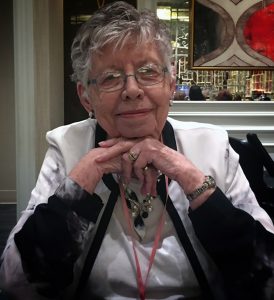
It’s a wonder I never gave up—not sure if it was stubbornness or not having good sense.
My first book to be published was an historical family saga accepted by a New York publisher. I had another similar novel I submitted to them next, but my editor had moved on and her replacement sent me a rejection.
Without going into detail, the next publisher who accepted one of my books died. Another publisher published the 2nd family saga and I received some royalties. The publisher got greedy, blew his profits in Vegas, didn’t pay royalties and ended up in jail. Another of my books was published, I received 50 copies and that publisher disappeared.
My Rocky Bluff P.D. had a series of stumbling blocks. The first book, Final Respects, was published by someone I found in Writers Digest Market. When he contacted me he said he was only doing electronic books. I had no idea what he meant, but sure enough he published the book for people to read on their computers. (No such things as an e-reader at the time.) Two problems with this, it was far too difficult to purchase, and no one wanted to read a whole book on a computer screen
Along came the Rocket E-Reader, great invention, though it was soon bought by another company whose reader wasn’t near as good. Another publisher picked up my series and hooray, he also published books in trade paperback. The only problem with this fellow was he never got around to paying royalties. I took back my rights, found another publisher who did two more of the books in this series—then she decided she didn’t really want to be a publisher. Next, I went with Oak Tree Press, the publisher put out several of the series and everything went well—until sadly, she passed away.
Next came Aakenbaaken and Kent, a great publisher, but by this time I had so many books in the series it was a bit overwhelming as they all needed to be republished which would take a lot of time. One of my friends asked me why I didn’t self-publish. My answer, mainly because I didn’t know how to do it. She offered to help, together we re-edited all of them, her husband redid the covers and she did the actual publishing, and now the whole series is under my control.
And if you don’t think those stumbling blocks were enough to make me think twice about being a writer, much the same happened with my Deputy Tempe Crabtree series, yes, I know it’s hard to believe, but my first publisher who became a good friend, died unexpectedly. The second one gave up her business, the third was great and published many books over several years until the business failed.
That series is now self-published too.
Am I glad I stuck it out? Of course, though at times I felt discouraged, but I wanted to know what was happening with those characters I’d created and the only way to find out was write another book—and find another publisher—or doing it myself.
—Marilyn Meredith
Outgoing Newsletter Editor
PROMOTION HELP
Brother member George Cramer is working hard at promoting authors and their work, especially those who are part of PSWA. In the last few months, he has hosted seven members, including our president, John Schembra. Three members will be answering questions about writing, their background, and their books.
Our own Marilyn Meredith will be visited on January 4, 2021, followed on the 7th by Tim Dees and Dave Freedland on the 14th. Mark your calendar, stop by https://gdcramer.com and learn more about our sister and brother members.
If you are interested in one more way to promote your work, give George a holler at gdcramer@msn.com.
RECRUITING
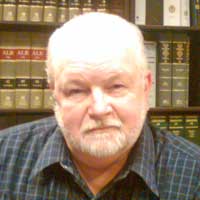
With all the calls for defunding the police or reducing our numbers, the question is who will replace us? How long will it take for cities to come to their senses that they need the police? Suggestions have been made to using social workers as a replacement or having them work injunction with police officers. In most cities, social workers are overwhelmed with the work they have and these bureaucrats think they can handle integrating into police work on top of their regular workload? Or maybe they’re talking about hiring more social workers specifically to work with the police. How would the protocol go? Who would be the lead investigator, the officer or the social worker? Maybe the social worker would be the lead investigator and the officer would only be needed if an arrest was to take place. What if the subject resisted arrest, I’m sure the social workers would be prohibited from taking any physical action or could easily become a hostage.
Imagine how that job interview would go for a social worker hired specifically to work with police. Their job experience and academic credentials would be paramount, but what other questions would be pertinent? What is their attitude toward law enforcement? How do they feel about having a close association with law enforcement? Applicants would be concerned about their own safety and what would be done to protect them. Will the recruitment involve both social worker supervisors as well as law enforcement officials?
My department went through several transitions in reference to recruiting. They were required to give residents of the District of Columbia preference. At one time all applicants were required to live in the District of Columbia, but the cost of living in the city was too exorbitant. They were already giving preference to people from the military or people with a college degree. Recruitment officers went on recruiting trips to colleges, universities, and even went to Puerto Rico. They took applications from a number of Puerto Rican police officers. They subsequently hired several of those officers. Unfortunately, they had some difficulty with tests at the academy and the tests had to be translated into Spanish.
Recruiting qualifications vary little with most of the large police departments. The Los Angeles Police Department has a very vigorous vetting process to become a police officer. They offer college courses in preparation for completing the hiring process, but they do not require a college degree or college hours or credits. Applicants are required to complete a Personal Qualification Essay, accessible at various official locations. You do not have to be a resident of Los Angeles. The Baltimore City Police do not require college, you can take a test on the National Testing Network which is available in 30 different states. The Miami Police Department applicants are required to take and pass the Florida Department of Law Enforcement Basic Abilities Test which is offered at various locations at the applicant’s expense. Miami doesn’t require a college degree. All of these departments have fitness requirements, conduct medical and psychological exams, do thorough background investigations and run each applicant through a polygraph examination.
Applicants for the New York City Police Department are required to have a high school diploma plus 60 college credits with a minimum 2.0 GPA. They’ll waive that requirement if the applicant has at least 2 years active duty with the military, but require applicants to live within the five boroughs or surrounding counties. Washington, D.C.’s Metropolitan Police Department also require 60 semester hours of college, but will waive that if the applicants has at least 2 years active duty with the military or 3 years of law enforcement experience. In Chicago, an applicant is also required to have 60 semester hours of college. That can be waived if the applicant has 3 years of active duty with the military or 1 year with 30 semester hours of college. The applicant must also be a resident of Chicago at the time they are hired. Both Chicago and the LAPD will hire non-citizens who are permanent residents and in the process of obtaining citizenship.
Giving applicants preference if they have military experience or law enforcement experience, a resident of the city they are applying to, seem standard, but requiring college, to me, is discriminatory. This isn’t about race, it’s about economics. Not everyone can afford to go to college. Police work involves dealing with people, having people skills. Sure the technology involved in police work has greatly improved. Learning the laws and how to enforce them comes after a person is hired. Gathering forensic evidence and crime scene preservation require additional training after becoming a police officer. I remember an officer who came to my district who was a Harvard graduate. He had a degree in sociology. His ultimate goal was to help people, like a lot of police officers. He’d been on the street for several months, when he came to me in the locker room. He was very frustrated. So many times he had offered to help people he encountered and so many times they refused his help and were indignant about him thinking they needed help. I told him it was great that he wanted to help people, but he was a police officer and that’s how they saw him. He needed to learn that arresting someone for committing a crime, which is our job, was a first step in helping them if they wanted it. The court system offers many programs aimed at helping people get away from a life of crime, but it requires their initiative. Needless to say, having a college degree is important and helpful in advancing in the department. It just shouldn’t be a prerequisite to being hired as a police officer.
Early in my career, I had the occasion to ride with a black officer who always raised questions about discrimination within the department. This particular night we had a female ride-along from the Pilot District Project, people within the community who monitored police activity. We got a run to investigate the trouble. It turned out to be a boyfriend girlfriend argument which resulted in the boyfriend kicking his 8 month pregnant girlfriend in the stomach. We transported the young woman to a hospital. The young woman repeatedly said she would make a complaint and come to court. I remained in the police car to advise our dispatcher where we were. My partner and the ride-along went in the hospital with the victim. Before I could tell the dispatcher our location, my partner and the ride-along returned to the police car. I asked my partner if I needed to get numbers for our report. My partner said it wasn’t necessary the victim declined to make a complaint, but what he said next disturbed me. He said, “You can’t help those people.” We continued on patrol and a short time later he went on a rant about discrimination in the department. I confronted him with his own statement, “You can’t help those people” and accused him of discrimination. He shut-up when the ride-along agreed with me.
There is a lot of talk about so-called institutional racism and police are indiscriminately being called racist, whether they are white or black officers. Racism has no place in law enforcement, but sometimes it rears its ugly head within our ranks. Can this be detected during the recruiting process? Hopefully through some testing processes, interviews or through the psychological evaluation, but as we know some people can hide it very well. Police academies do their best, through various learning scenarios, diversity training and field officer training to detect racist behavior. A racist police officer hurts every police officer he or she works with and should be reported. One officer’s behavior can result in other officers being injured. It could be days, weeks or even months after the person was subjected to a racial slur or treated with total disrespect. Think about how you felt after experiencing truly bad customer service or insulting behavior. You may not have felt like fighting that person, but if you went to the same establishment again, or were in a similar situation you likely had a chip on your shoulder.
As you might gather the recruitment process is very important to the character of a police department and the safety of its officers and the citizens they serve and protect. The process should never be taken lightly. If a racist or corrupt person manages to evade the safe guards put in place and becomes a police officer it is up to his or her fellow officers to blow the whistle and stop the behavior.
—Joseph B. Haggerty Sr.
Retired Vice Detective and Academy Instructor
Author of the novels: Shame: The Story of a Pimp and An Ocean in the Desert
Award winning poet, writer and lecturer on the sexual exploitation of women and children in prostitution and pornography
MEETING THE CHALLENGE—HOW I WROTE FIVE NOVELS IN ONE YEAR
This has been a year of challenges. In January 2020 I signed a contract to write four novels in a new series, Trackdown, during the course of the year. Shortly after embarking on the first one in the four book series, an opportunity arose to do another western in the Gunslinger series. Since I’d already done two books in that one as A.W. Hart, who’s an Amazon bestselling author, and was familiar with the characters, I agreed. They needed this particular book in a bit of a hurry (April 15th), and my first one of the four Trackdown series novels was due on March 15th, I was a bit hesitant to take on more work. But I’d done two separate projects simultaneously in the past, so I signed another contract.
This brought my total up to five books in a year.
Writing two discrete projects in tandem isn’t easy, and downright impossible if you don’t have a solid story idea for each one. Fortunately, I did have an idea for the new western rolling around inside my head and I quickly wrote the outline. The idea I had was to combine the aspects of a traditional western with the elements of a horror story. Well, I guess it would be more like a monster story. I’d already started the first Trackdown novel, Devil’s Dance, and was underway with the writing. So I proceeded like I had before, working on both projects on alternating days. It helps if the two are in different genres like these two were. Gunslinger: Killer’s Ghost was set in the Old West, while Devil’s Dance was about modern day bounty hunters and set in the present.
The Gunslinger series features two teenage, fraternal twins, Abby and Connor Mack. They’re traveling in the company of gunslinger, River Hicks, who’s teaching them about survival and life. The relationship is far more complex than I could explain here, but suffice it to say, they’ve evolved into something of a family over the course of the series. This adventure finds Abby seriously ill with her brother and Hicks trying to find a doctor. They end up at a mining encampment on the outskirts of a town run by a powerful and ruthless man who has his own reasons for wanting to drive the miners out. Add to this the fear in the encampment that Abby might be the vector for an epidemic, a talented Mexican gunman whose skill with a weapon rivals that of River Hicks himself, and a mysterious, legendary monster capable of tearing a man limb from limb. Yeah, Gunslinger: Killer’s Ghost has it all. I consider it my best western so far. And it was a blast to write. (Did I mention that it has a dash of romance, too, with Connor experiencing his first love?) I think it’s A.W. Hart’s best book. 😉
I finished Devil’s Dance by the March 15th deadline and then Killer’s Ghost by the April 15th date. I felt a sense of accomplishment having done two novels at the same time, and also for having finished two of the five I had to complete in the year. The Trackdown series features ex-army ranger Steve Wolf, a half-Indian protagonist who gets framed for a war crime in Iraq that he didn’t commit, and ends up serving four years in Leavenworth. When he gets out, he’s picked up (literally and figuratively) by his friend and mentor, ex-green beret Jim McNamara. McNamara has a bail bond enforcement business in Phoenix that he runs with his daughter, Kasey, and he invites Wolf to become part of the team. In the first book they travel down to Cancun in search of a bounty and end up running afoul of the forces of a very rich and unscrupulous man who was responsible for framing Wolf back in Iraq. This story arc was intended to flow through all four books, but each one had to stand on its own as a complete novel. I had to come with the next entry in the series and got busy on the second one, Devil’s Fancy, which had a due date of June 15th.
In the first book I introduced a lot of supporting characters including a trio of fabulous female bounty hunters, one of whom becomes romantically involved with Wolf. I also brought back some of the villains who were in Devil’s Dance. This one began to take shape and I got busy writing, finishing it a few days ahead of schedule.
It was now mid-June and I still had two more books to go before year’s end. As much as I hate to admit it, the PSWA conference getting cancelled actually worked in my favor. So did the COVID lockdown, which I hated almost as much as losing the conference. Both gave me a bit more time to write, but let me say this. If the conference had not been cancelled, I would have gladly written the program. I’m totally confident I could have done it, along with my ongoing writing deadlines.
But anyway, the original template I designed for the four book series had changed a little bit, and I had to make a few adjustments. The underlying story arc remained the same, but I had to figure out how to keep things going while still making the main plot independent. My next deadline was September 15th. With Devil’s Brigade I explored the relationships between Wolf and McNamara’s daughter and grandson. I also added a mission to grab a wanted subject in an “autonomous zone,” where law and order were declared illegal, and an armed militia group, aptly calling themselves the Devil’s Brigade, that was intent on funding their paramilitary organization by knocking over armored cars.
Now it was four down and one to go.
I had until December 15th, three months, to finish the fifth book of the year and final book in my Trackdown series. It had been my intention all along to complete the story arc that I started, but I also had to decide if I should leave things open so that the series could continue. My original title for the fourth book in the Trackdown series underwent a couple changes, but I finally decided on Devil’s Advocate.
I looked at the opportunity to write five novels in a year’s time as a challenge, and I’m proud that I was able to do it. I must also admit that as the year drew to a close, I was feeling a bit burnt out and exhausted.
But that’s didn’t mean that wasn’t going to start a new book before the year was completely gone … It seems that somebody was asking what old A.W. Hart had going on with the Gunslinger series.
Write on. 😉
—Michael A. Black
Note: Gunslinger: Killer’s Ghost was released on June 15, 2020
Devil’s Dance was released on November 18, 2020
Devil’s Fancy was released on December 16t, 2020
Both are available through your bookstore or on Amazon.
Coming soon in 2021: Devil’s Brigade and Devil’s Advocate.
AN IMAGE IS WORTH A THOUSAND WORDS OR…A NOVEL?
The Birth of The Mona Lisa Sisters
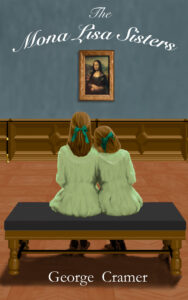 Ten years ago, I was managing Safety and Security for Palm, Inc. A few months later, Hewlett-Packard acquired Palm in what is often referred to as a disastrous acquisition. Not long after, H-P began the layoffs. I got a weekly list of those to be laid off the following week. When the notice came for my team, I gave them the week off to start on a job hunt. A few weeks later, I learned I would be terminated the following Monday. I cleaned out my office but hung around in case there were any problems.
Ten years ago, I was managing Safety and Security for Palm, Inc. A few months later, Hewlett-Packard acquired Palm in what is often referred to as a disastrous acquisition. Not long after, H-P began the layoffs. I got a weekly list of those to be laid off the following week. When the notice came for my team, I gave them the week off to start on a job hunt. A few weeks later, I learned I would be terminated the following Monday. I cleaned out my office but hung around in case there were any problems.
Then began my introduction to how rampant age-discrimination had become. After three months, it was so obvious; I started a spreadsheet. I recorded 140 applications after that. Often, I could swear the hiring company had used my resume as the requirements for the position. My mistake was being honest. I included that I was a Vietnam War Veteran. Any H/R person in the world would spot that and know I was at least sixty years old. I got one interview. I walked in, business suit, tie, and white hair. The two people I talked with were wide-eyed twenty-somethings. They were polite in their T-Shirts, torn pants, and sandals . . .for about five minutes. Then, “Thank you for coming in, George. Have a good day.”
Early 2012, I saw that the local senior center was offering a writing class. I figured it might help with a new resume—wrong. It was a fiction writing class. I was learning creative writing, and I loved it. After a month or so, the instructor passed out random pictures to each student. The assignment: “Study the image, taken fifteen minutes, and describe the scene.”
I took one look at my picture, two girls looking up at the Mona Lisa, and ignored the assignment. In those fifteen minutes, I knew I would write a novel. I had notes on paper, the story in my mind, and the title. And it all came together to form the genesis for The Mona Lisa Sisters.
That began an eight-year journey.
I enrolled at Las Positas College and took writing classes. Unlike my earlier college years, it was no longer drudgery. I earned straight As. The assignments lead to multiple revisions of my novel.
In a class taught by Karin Spirn, I read about a fantastic instructor at UC Berkeley who did not have a doctorate. Instead, he held an MFA. In another class, I was introduced to the work of Native American poet Joy Harjo. She was recently appointed to a third term as the U.S. Poet Laureate. I began following her on social media. I saw that Harjo was a guest lecturer at the Institute of American Indian Arts, MFA Program. An enrolled descendant of the Karuk Tribe of California, I called IAIA and applied. Five days later, I received an acceptance notice for the Low-Residency MFA Program. IAIA, Santa Fe, New Mexico.
For the next two years, my manuscript was my thesis paper, The Mona Lisa Sisters. I rewrote, revised, and learned. My mentors were terrific and have, over time, become much more to me. One area that I got dinged on was when I brought my characters to the dinner table. The settings often lacked enough detail to draw the reader into the scene. Ismet “Izzy” Prcic, roared “People don’t go to dinner and leave. They eat. What the “F” are they eating—saying?”
Mona Lisa is set in the early 1890s. So, I had much research to do before bringing food to the table. I did it—overdid it—added several thousand words. Izzy, “I don’t need to know every single effen thing they ate and how it was prepared.” I subtracted words to please him.
Each addition or subtraction required rewrites.
The program required a great deal more than working on my manuscript. I attended lectures, readings, workshops, and read and wrote critical reviews of over forty books. Two authors I had held extreme distaste for became favorites—Albert Camus and Joyce Carol Oates. Most of those forty books are full of underlining, highlighting, and writing in the margins. My mentors and I collaborated on the selection of books. Native Americans wrote at least half our choices. I was introduced to the work of such great authors as,
- Debra Magpie Earling (Bitterroot Salish) – Perma Red
- Louise Erdrich (Chippewa) – The Round House
- David Treuer (Ojibwe) – Little
- Leslie Marmon Silko (Laguna Pueblo) – Ceremony
I met many who shared their world and writing. I met Joy Harjo and chatted over cafeteria dinner. Tommy Orange, There There, was a contemporary, as was Angela Trudell Vasquez. Angie is the Poet Laureate of Madison, Wisconsin.
When I faced the challenge of my thesis/manuscript, one of the questions came from another, fantastic teacher and author, Pam Houston. Her first question had to do with the scenes set in . . . the dining room. I shouldn’t have, but I laughed. I know Izzy put her up to it.
This year, I finished the twenty-third revision of The Mona Lisa Sisters. Agent queries had been returned with polite rejections. I sat back, told the manuscript, “I’m starting to hate you. I’m finished.”
I reached out to Paula Chinick of Russian Hill Press and told her I was done and wanted her to publish the bloody thing. She agreed. I figured my work was done—wrong.
The cover design took months. Getting back-cover reviews became urgent. I was stuck until I recalled a talk where a young author mentioned he sent out requests to known authors and asked them to read and write reviews. “What have I got to lose?” I asked myself and sent out four requests. Three agreed to write reviews. I even had one person, out of the blue, offer to write one.
I used two. Ramona Ausubel wrote one. I love her novel No One is Here Except All of Us. The other, by playwright, editor, and UCLA instructor Victoria Zackheim. I also used a Kirkus review.
Violet (Vi) Moore came on board as the editor. She forced me to pick up the manuscript and read it line by line and make corrections before she would touch it. I’m glad she did. Over two months, we made more corrections and changes than I will ever admit.
Then the galleys came, and Paula made me do it all over again. The editor is usually done by then, but Vi called me and ordered me to reread it. I know we missed at least one typo. One of my readers sent me a note informing me of it.
Paula, Vi, and the cover design team were all very reasonable in the charges to bring the project to fruition.
Amazon released The Mona Lisa Sisters on August 14, 2020. A little over eight years after the instructor handed me a picture of two young girls looking at the Mona Lisa.
I met and have become friends with so many fine people as the result of my diving into the world of fiction writing. I have been and will ever be blessed for having started the journey when I couldn’t find a job.
Link to buy The Mona Lisa Sisters
George Cramer
MURDER AND MAYHEM IN A MODERN NOIR STYLE
“The Senior Sleuths” Mysteries:

In my modern noir stories, the hard-boiled detectives are soft-boiled sleuths whose inner shell is softer and gentler, although their outer shell is still tough. Of course, it doesn’t matter—hard-boiled or soft-boiled—they can still be nearly beaten by the bad guys. But it is always the puzzle of the mystery and putting the pieces together to solve it that matters most.
Film noir movies are from the era of the great mystery writer’s books including those by Raymond Chandler, Dashiell Hammett, Ross Macdonald and others. Their writing and their black and white movies influenced my writing in recent years. I was always fascinated by how the characters acted and interacted. I especially loved strong women who influenced the actions and the outcomes.
My all-time favorite was “The Thin Man,” where Nora Charles was certainly equal to Nick Charles, her charming husband. Smart, slender, attractive and rich, Nick adored her. Now what woman doesn’t want that?
The plot of “The Thin Man” was enhanced by humor, with the couple’s dog, Asta, running amok at times and oddball characters from Nick Charles’ past popping in and out. There was always a murder, or several of them, that had everyone, from police to Nick and Nora, in on the chase. In my series, “The Senior Sleuths,” Dick and Dora Zimmerman, Zero and others take on similar roles.
According to Eddie Muller, Noir Alley host on TCM, “Film noir peaked as a popular genre of film during the mid-1940’s into the 1950’s. These films gave rise to iconic antiheroes like detectives Sam Spade, Mike Hammer and Philip Marlowe. Though the stories change, the mood is the same in a film noir.”
Typical film noir scenes use shadows, dark streets, neon signs, murderers and murders, plus ominous actions and characters. They take place in a city like New York, Los Angeles and Las Vegas. Muller describes the characters: “The men and women of this sinister cinematic world are driven by greed, lust, jealousy, and revenge.” So are my bad characters.
I’m having a great time creating murder mysteries in a modern noir style. The once hard-boiled masculine detective now has a new, softer voice, and there are new heroes and antiheroes. My stories have soft-boiled sleuths. Of course, they still encounter murder and mayhem.
In my senior sleuths series I also wanted to address issue of being a senior and being active, adventurous, interesting people. Still in their early sixties, Dick and Dora Zimmerman’s not only have the time—but the money, the smarts and the chutzpah—to get involved even when they are warned by police and criminals to stay away. It seems murders fall in their laps, sometimes on them.
Even when facing danger in the course of solving a murder, they mix wit and humor and are accompanied by a colorful cast of cohorts. They strive for justice, not an easy thing to accomplish when the bad guys are as determined to strive to do evil.
“Reading Dead in Bed, the first twisty and fast-paced book in Rosen’s new mystery series, The Senior Sleuths, I found myself laughing and biting my nails at the same time. Sure, her characters Dick and Dora Zimmerman are no spring chickens, but they’re every bit as feisty and resourceful as her younger detectives in her Dying to be Beautiful series. What a ride!” –Claudia Riess, Author, Art History Mystery Series
by M. Glenda Rosen (aka Marcia Rosen)
Recently re-released, Book One: Dying To Be Beautiful: Without A Head, Level Best Books
MEMBER NEWS
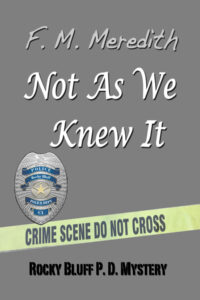 Marilyn Meredith has a new Rocky Bluff P.D. mystery out called NOT AS WE KNEW IT written as F. M. Meredith. Despite hearing from readers and writers alike that no one wanted to read a book with Covid 19 in it, since this series is in more-or-less real time, she didn’t know how to avoid it—and ended up having fun while writing about how the officers and families were dealing with the crisis. The blurb goes like this
Marilyn Meredith has a new Rocky Bluff P.D. mystery out called NOT AS WE KNEW IT written as F. M. Meredith. Despite hearing from readers and writers alike that no one wanted to read a book with Covid 19 in it, since this series is in more-or-less real time, she didn’t know how to avoid it—and ended up having fun while writing about how the officers and families were dealing with the crisis. The blurb goes like this
The challenges come one after another for the Rocky Bluff P.D. to handle―from a missing woman to a fatal house fire. Detective Doug Milligan is faced with new and unusual problems to solve, some on the job and others related to his family. With the department shorthanded because of the Covid virus, Chief Chandra Taylor must make some hard decisions in order to protect the town of Rocky Bluff.
Not As We Knew It is available on Amazon in paperback and for Kindle.
Scott Decker was recently hosted by A&E’s highly successful History Channel podcast, “History This Week” (October 11, 2020). Scott discussed his book, Recounting the Anthrax Attacks, post-9/11 events, and our war on terrorism. Link: https://bit.ly/37EZ8d9
Scott appeared on Vice TV’s popular new series, “While the Rest of Us Die,” which premiered on November 16, 2020. Scott described how the 2001 anthrax attacks revealed inadequacies in Congressional planning for Continuity of Government. Link: www.vicetv.com
Scott was a guest on fellow PSWA member, George Cramer’s well-received Blog for November 23, 2020. Link: www.gdcramer.com
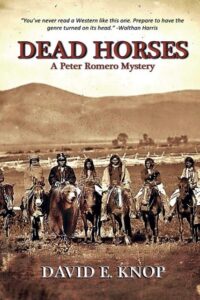 David Knop’s latest book, Dead Horses, A Pete Romero mystery, is getting rave reviews, this is the latest:
David Knop’s latest book, Dead Horses, A Pete Romero mystery, is getting rave reviews, this is the latest:
“Excellent mystery. From the first page, this book hooked me in. Characters were real, interesting and believable. Felt like I was in Tribal Police Officer Romero’s head and life. Knop has a talent for putting me right in the middle of the story. Scenes were detailed and authentic. Enjoyed the Southwest and tribal descriptions, which I know well. Indian supernatural beliefs were a nice twist. Liked Romero and rooted for him to solve a tangled web of major corruption and somehow survive. I look forward to reading Knop’s other books.
Kelli Peacock is proud to announce the publication of her third book: No Man’s Land.
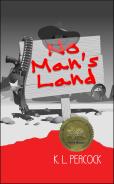 The Crossing Series, set in a fictional town in West Texas, has its real-life problems – murder, mayhem and humor. Featured are Sheriff Chris Winters, a retired Navy Seal, now turned sheriff, and his strong-willed, former spy, wife Kali. Together along with the deputies, a mysterious medical examiner, and a loveable Episcopal Priest, they unravel the deepest secrets of the area. Each book builds on the curious history of the region and the memorable characters who call The Crossings home.
The Crossing Series, set in a fictional town in West Texas, has its real-life problems – murder, mayhem and humor. Featured are Sheriff Chris Winters, a retired Navy Seal, now turned sheriff, and his strong-willed, former spy, wife Kali. Together along with the deputies, a mysterious medical examiner, and a loveable Episcopal Priest, they unravel the deepest secrets of the area. Each book builds on the curious history of the region and the memorable characters who call The Crossings home.
No Man’s Land –
All Sheriff Chris Winters of The Crossings wanted was to get through the last few months of his term without any more murders or mayhem. It was not to be.
Right up to the Sheriff’s back yard was an expanse of deserted land knowing locally as No Man’s Land. Nothing ever happened there, until everything happened there.
It started with a group of local teens getting high on Jimson Weed, an easy mystery compared to the mysterious lights, UFO sightings, missing children, drug cartels and surprise bodies. And did the teens forget to mention their gold digging? Oh, yeah, rumors of missing gold caches that lure more than one group back out to the increasingly dangerous No Man’s Land.
Now Chris must team with the Feds to save the teens all the while dealing with a shootout and hostage situation between the drug dealers and UFO hunters.
Retirement can’t come soon enough.
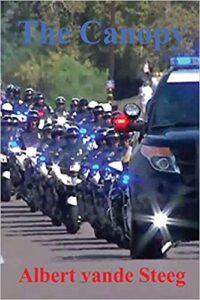 The Canopy is more than the welcoming entry to the cop bar, it is the title to Albert Vande Steeg’s novel about what happens in a cop bar. The stories and events shared at The Canopy make for great reading.
The Canopy is more than the welcoming entry to the cop bar, it is the title to Albert Vande Steeg’s novel about what happens in a cop bar. The stories and events shared at The Canopy make for great reading.
Interwoven in the action of Jack Hilberg and Ray Follett are the events that resulted in the death of Officer Ricardo Augustino. The aftermath of Ricky’s killing ripple through the Department and into the lives of Jack and Ray and their families. It is heart gripping and inspiring.